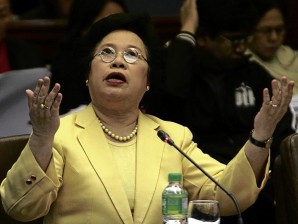
Senator Miriam Defensor-Santiago. INQUIRER FILE PHOTO
MANILA, Philippines – No less than the office of Senator Miriam Defensor-Santiago has received more than P15 million additional maintenance and other operating expenses (MOOEs) in 2012, the head of the Commission on Audits said.
In her letter to Santiago dated January 21, 2013, COA chairperson Maria Gracia Pulido Tan noted that the office of the senator got a total P15, 492,292 last year.
“It appears from records submitted by the Senate accounting office tour resident Auditor that additional MOOEs were given to members of the Senate at different dates during 2012,” Tan said in her letter.
“For your office, we note that a total of P15,492,292 was given on various dates in March, May, June, July, August, September, October, November and December as additional MOOE,” she added.
Tan’s letter was in response to Santiago’s letter to her last January 10, 2013 regarding the use of savings of the Senate and the power of the Senate President to realign the budget as additional MOOEs of the senators.
Santiago has been questioning the authority of Senate President Juan Ponce-Enrile to use the Senate’s savings when he gave all senators a total P2.22 million each in November and December 2012 except her and three others—Senate Minority Leader Alan Peter Cayetano, Senators Pia Cayetano and Antonio Trillanes IV.
Santiago and the three senators only received P600,000 each in November but not the P1.6 million given in December last year.
But in her letter, Tan pointed out that under Section 53 of the General Appropriations Act (GAA), “the President of the Philippines, the Senate President, the Speaker of the House of Representatives, the Chief Justice of the Supreme Court, the Heads of the Constitutional Commissions enjoying fiscal autonomy, and the Ombudsman are…authorized to augment any item in (the GAA) from savings in other items of their respective appropriations.”
“Congress has also authorized other government agencies to augment these,” she added.
The GAA, Tan said, did not specify when the Senate President can or should exercise his authority to augment any item in the GAA from any savings in other items of the appropriations.
Tan said Section 54 of the GAA also defines “savings as “portions or balance of any appropriation (in the GAA) free from any obligation or encumbrance which are still available after the completion or final discontinuance or abandonment of the work, activity or purpose for which the appropriation is authorized; from appropriation balances arising from unpaid compensation and related costs pertaining to vacant positions and leaves of absence without pay; and from appropriation balances realized from the implementation of measures resulting in improved systems and efficiencies and thus enabled agencies to meet and deliver the required or planned targets programs and services approved at a lesser cost.”
“In our humble opinion as the government’s auditors, the above provision is clear and readily understandable,” Tan said.
It was beyond COA’s mandate, she said, to “enumerate what savings are valid for purposes of augmentation.”
“Our mandate is to examine and audit if the augmentation in fact sourced from savings as so defined by Congress,” she said.
Since the law itself allows augmentation from savings and realignment of appropriations, Tan said the COA does not inquire anymore if the savings are deliberately being generated for such purposes.
“To reiterate, our duty is to examine and validate if the augmentation is in fact sourced from savings, and whether requirements of law have been complied with in effecting such augmentation ad/or realignment,” she said.
As to Santiago’s query whether an additional MOOEs can be treated by the senator as additional pork barrel spent, not on office expenses but on alleged charitable donations or public works projects, the COA made it clear that MOOE was not a discretionary fund.
Section 63 of the GAA, she said, provides expressly that appropriations for MOOE shall be “available for release and obligation for the purpose specified and under the same special provisions applicable thereto, for a period of extending to one fiscal year after the end of the year in which such items were appropriated.
In respect to the Senate, Tan said , the MOOE should be used for travelling, communication, repairs and maintenance, transportation and delivery, supplies and materials, rents, utility, training and scholarship, extraordinary and miscellaneous, taxes insurance premium and other fees, professional services, printing and binding, advertising, representation, subscription, and membership dues and contributions.
“As above mentioned, the additional MOOE must be used for the purposes as listed in the GAA. Use as pork barrel is not among them,” the COA head added.